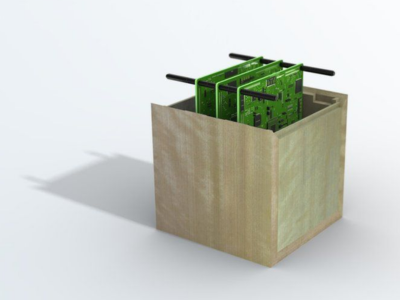Timber in Orbit: Japan's Wooden Satellite Prepares for 2024 Launch
In a daring move, researchers from Kyoto University and Sumitomo Forestry are planning to launch a wooden satellite into orbit by 2024.

This innovative project, known as the LignoSat Space Wood Project, started in April 2020. Their goal is simple but ambitious: they want to see if wood can survive the harsh conditions of Low Earth Orbit (LEO), a challenge usually faced by metal-based satellites. This exciting work could change the future of space technology, making it more sustainable.
“The experiment’s results astoundingly proved the resilience of wood under simulated LEO conditions,” announced Koji Murata, the spearhead of the space-wood research initiative, in a 2021 statement. Murata’s intention was to delve into the impacts of the harsh LEO environment on organic materials.
To facilitate this experiment, a panel carrying three different wood samples was sent to the International Space Station (ISS). The panel found its temporary home in the Japanese Experimental Kibo Module on the station, enduring the vacuum of space for a full ten months during 2022.
After this comprehensive exposure, Japan Aerospace Exploration Agency (JAXA) astronaut Koichi Wakata oversaw the successful retrieval of the wood panel, which was then transported back to Earth aboard SpaceX’s CRS-26 cargo Dragon spacecraft in January 2023. The subsequent analysis conducted by Kyoto University researchers authenticated wood’s extraordinary durability in space, with the study reporting “no decomposition or deformations, such as cracking, warping, peeling, or surface damage,” in the face of extreme exposure.
The compelling findings led the researchers to select wood from Magnolia trees for the next phase of the LignoSat project, due to its “relatively high workability, dimensional stability and overall strength,” according to the team’s press release.
 The transformative discovery heralds numerous opportunities, especially when considering the environmental advantages wooden satellites could hold over traditional metal-based ones. Not only does wood offer a cost-effective and cleaner production process, but it also provides an environmentally conscious solution to the prevalent issue of space debris disposal.
The transformative discovery heralds numerous opportunities, especially when considering the environmental advantages wooden satellites could hold over traditional metal-based ones. Not only does wood offer a cost-effective and cleaner production process, but it also provides an environmentally conscious solution to the prevalent issue of space debris disposal.
In general, most deorbiting satellites incinerate in Earth’s atmosphere, with the remaining fragments deliberately directed to descend into remote oceanic regions. However, wooden satellites are anticipated to completely combust upon reentry into Earth’s atmosphere. Even in the highly improbable event of any fragments surviving this descent, these organic materials would naturally decompose, eliminating the risk of hazardous debris.
Geared up for its extraordinary next move, the LignoSat project is all set to propel the world’s first wooden satellite into orbit next year. This pioneering effort is the fruit of a collaborative endeavor between NASA and JAXA. It stands as a landmark moment, heralding a new chapter in the story of satellite manufacturing technology.
READ MORE
-
India Successfully Lands Spacecraft on Moon’s South Pole
India achieves a historic milestone by successfully landing Chandrayaan-3 spacecraft on the moon's south pole, marking the nation's ascent to lunar exploration. Learn about the significance of this achievement and its implications for space exploration.Read More -
Timber in Orbit: Japan’s Wooden Satellite Prepares for Launch
In a groundbreaking endeavor, Japanese researchers are challenging conventions by showcasing the unexpected resilience of wood in the hostile environment of outer space. This extraordinary feat raises an intriguing question: could wooden satellites hold the key to a sustainable future for space technology?Read More -
Seradata Welcomes Melissa Quinn: New Horizons with EVONA
Breaking: Melissa Quinn's new role unveiled - placed by EVONA. Discover her transformative journey from Spaceport Cornwall to Seradata.Read More